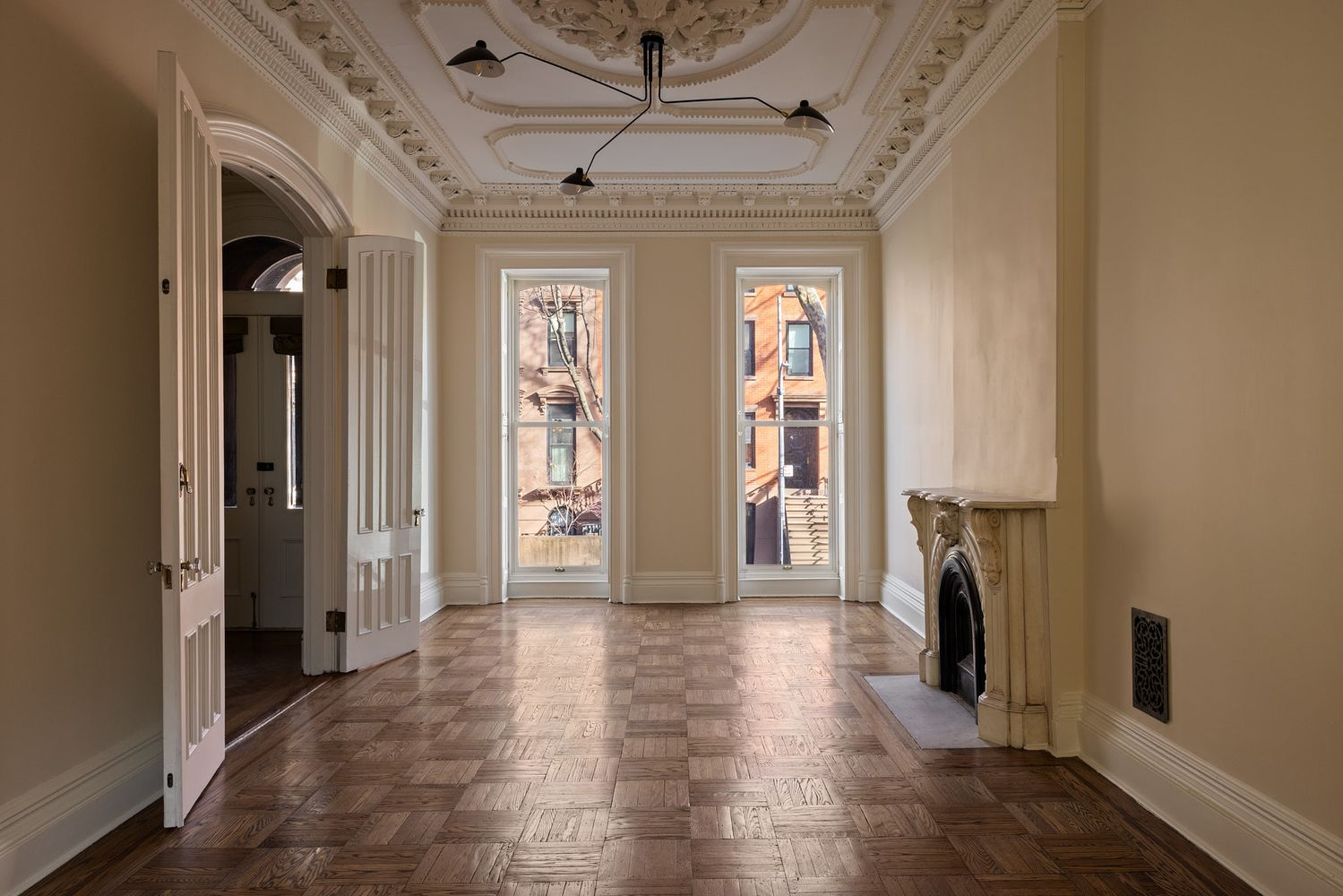Contractor Contracts: Devil's in the Details
As The Times pointed out last weekend, when it comes to planning your renovation with your architect or general contractor, make sure you get as much detail as possible in writing. Who owns the drawings? Who will be responsible if a subcontractor places a lien on the property? What are the milestones for payment? “Whether…

 As The Times pointed out last weekend, when it comes to planning your renovation with your architect or general contractor, make sure you get as much detail as possible in writing. Who owns the drawings? Who will be responsible if a subcontractor places a lien on the property? What are the milestones for payment? “Whether or not these issues are resolved ahead of time can mean the difference between a project that ends on a happy note and one that ends in litigation. The hardest thing for us was defining the quality of finish. Since we didn’t have the budget to strip every molding and door, for example, we had to specify which rooms of the house were getting what attention to detail. Any words of advice or horror stories to share?
As The Times pointed out last weekend, when it comes to planning your renovation with your architect or general contractor, make sure you get as much detail as possible in writing. Who owns the drawings? Who will be responsible if a subcontractor places a lien on the property? What are the milestones for payment? “Whether or not these issues are resolved ahead of time can mean the difference between a project that ends on a happy note and one that ends in litigation. The hardest thing for us was defining the quality of finish. Since we didn’t have the budget to strip every molding and door, for example, we had to specify which rooms of the house were getting what attention to detail. Any words of advice or horror stories to share?
Renovation Contracts: No Point Is Too Small [NY Times]
Illustration by Tom Bloom





No argument, 9:22. It is admittedly hard to budget a renovation and then pay 15%-20% on top of that for architect fees — and when you’re economizing it seems like an easy budget cut to make to axe the architect. And, with the right contractor and a good vision, it may well be prudent. I tell my clients a good GC is worth about four of me.
BUT: the best combo by far is a good architect with a good GC. Sure, many GCs don’t want to meddle with an architect (they know, rightly, that we will advocate for the client, push for the right way, not the easy way — and we can judge just how far work has progressed for payment). But some GCs recognize it is easier to build when someone else has figured out the basic “idea” of what’s going on. Too many people hire a GC and expect the GC to design AND build it — something that takes extra time and energy. A GC’s world is filled with coordination and sequence, while the design process is typically back-and-forth, so “designing” in the midsts of “building” can be a frustrating exercise for the contractor, and an uncertain one for the client.
There are advantages of course to “design-build” outfits, but remember that the design time (and its back and forth nature) really can’t be shortcut, unless your contractor just opts for a stock solution. And that is quite often what people get when they cut the middleman (the architect) out of the picture.
There’s an advantage of having the design process run by someone interested in _your_ design, not interested in how quickly _a_ design can be built. This advantage is fully on top of others, like knowing what needs to be filed and what doesn’t. And speaking of filing: woe be to those who need something retroactively filed (e.g., for a sale, to change a C of O, for a mortgage, to clear a violation, whatever). No one I know likes to do it (so therefore they usually don’t), and it’s not cheap. When you get to that point, you really have been penny wise but pound foolish.
–an architect in Brooklyn
Id love to know where everyone seems to find these honest and top notch contractors who don’t fleece their customers, get the job done properly and on time.
I can’t even get contractors to give me accurate estimates or an estimate at all, no less sign an oath in blood of this nature.
Further, unless you plan on litigating, what good is that contract anyway? Its just two guys and their word. Unfortunetely, there are too many dishonest contractors out there who have no integrity – contract or no.
Hey architect in Brooklyn, it’s 9:22 here…
I actually concur with everything that you say, (and you give great reasons for why it would be impossible to provide “Guarantees”) but the reason I said what I said is because I have in the past received bids on jobs from licensed contractors (in Brooklyn) who have given me serious misinformation. In one particular case, three diffferent companies came out, two of the three even gave written bids, and told me verbally that an architect was not needed nor were permits. But I thought it seemed weird because I needed permits on a similar job I had done in the past in another state, so I asked lots of questions and finally the fourth guy I got a bid from ponied up the truth, and said I did need an architect’s stamped plans and permits! I was really pissed off from that experience – they must have known they were lying to me…Anyway – my project is still in the planning stages. But how many other people might have gone for it? Probably a lot.
I suspect that this happens frequently, maybe because for a typical kitchen or bath remodel, or basement conversion to a rental, the contractor pretty much knows what to do and wants the bid (without architect’s fees) to be reasonable in order to procure the job.
I have no doubt that involving an architect is the wise course – I just don’t think most people go for that level of expertise or expense when they call someone to work on their home. And based on my experience, I know that there are pros out there who will not reveal the truth about filing plans if they think that it will inflate the costs of the job to the detriment of losing the potential client.
Oh, and one more note:
“Do you inspect every jobsite at every single stage and look at every junction box, check the lengths of wire protruding from those boxes, the connections of cast ironwaste pipes and their connection to the structure, the number of screws used to hold drywall panels, the exact mix of sand, cement, and aggregate that was used in the concrete poured, the soundness of every soldered joint in the copper piping, etc.??? Highly unlikely, I would have to believe. And how could you? You are sitting at a drafting table or meeting clients/potential clients all day…”
I don’t because specifically I can’t — I’m not allowed. The contracts I write with clients specifically prohibit me from taking such an active role in jobsite administration. If I were to take on such exhaustive supervision, a contractor could turn around and make me liable for the built construction. My own liability insurance doesn’t cover this.
This doesn’t mean I’m blinded. When I am onsite, I do look and I do call out anything I see is wrong. It’s not my responsibility to in the sense that the contract makes me; rather it’s my responsibility as part of my fiduciary duties to my client.
Fiduciary? Usually contracts written by an architect between a client and a contractor allow for the architect to be a client’s fiduciary (a client’s advocate): the “expert on your team”, as Dan has it above. These contracts also define specifically all work must meet Code and, better, all work must be done in a good, workmanlike manner, with the architect typically in charge of this defintion.
But nowhere is there a guarantee — and the reason is that such guarantees are uninsurable, and therefore not worth the paper they are written on.
The availability of an architect to safeguard a client’s interests in the building phase (pushing the contractor to honor design intent, good workmanship and Building Code) is an often overlooked but valuable service of architects. In fact, it may be our most valuable service.
–an architect in Brooklyn
Anon 9.22: Let me say I agree totally about working with people you trust. It is, perhaps, the only ironclad piece of advice worth anything in construction.
However, your solution regarding liability doesn’t work. You write,
“Doesn’t really matter if the plans were self-certified or not. Perhaps there were no plans filed at all…What about the huge numbers of jobs done every year with no plans or permits pulled? Contractors often lie to customers about the necessity of plans – ‘Naw, you don’t need a permit for that!'”
Please note If your plans aren’t filed, and you’re doing work that should be filed, you are defacto not to Code from the git go. It is disingenous to expect the Contractor to adhere to the Code but the client not to.
“That’s why I advocate making the contractor responsible in writing – Just because you as the architect specify X type whatever on your plans doesn’t mean the install guy won’t put in Y type whatever (and perhaps incorrectly, and not to code, to boot.)”
You can go one step further with this reasoning and see thatjust because you make a contractor responsible in writing (what writing? your own contract?) doesn’t mean the work will suddenly conform to Code.
For the terrible contractor, this clause won’t be understood (or accepted) and will therefore not impact the jobsite.
And for the good contractor, what’s the upside for the massive assumption of risk by the Contractor in your scenario? Will you reward such a clause with more money. My guess would be probably not. Do you think a Contractor will take on this extra liability out of the goodness of his or her heart? And who would adjudicate what is or is not Code, especially if, as above, there is no architect? Believe me, you won’t find a contactor good or bad who will honor such a clause (although you may find a clueless one who thinks s/he can). His own insurance won’t go to bat for him here because the implications are far too punative.
–an architect in Brooklyn
you get what you pay for. Andmost people on this blog in my observation are looking for deals, which equals cutting corners.
10:28,
9:22 here…
Licensed contractors cut corners all the time and often have inexperienced, stupid, lazy, apathetic (or a combination of the above) people working for them that make mistakes, sometimes resulting in work that is not up to code. And sometimes these mistakes take a long time to even become discovered – long after the DOB has “signed off” and the architect is no longer involved.
Doesn’t really matter if the plans were self-certified or not. Perhaps there were no plans filed at all…What about the huge numbers of jobs done every year with no plans or permits pulled? Contractors often lie to customers about the necessity of plans – “Naw, you don’t need a permit for that!”
The architect has little to do with what I’m (we’re) talking about here, which is the integrity of the contractor and the people he employs and the quality of the materials (often hidden under finish surfaces) that he or she uses.
Do you inspect every jobsite at every single stage and look at every junction box, check the lengths of wire protruding from those boxes, the connections of cast ironwaste pipes and their connection to the structure, the number of screws used to hold drywall panels, the exact mix of sand, cement, and aggregate that was used in the concrete poured, the soundness of every soldered joint in the copper piping, etc.??? Highly unlikely, I would have to believe. And how could you? You are sitting at a drafting table or meeting clients/potential clients all day…
That’s why I advocate making the contractor responsible in writing – Just because you as the architect specify X type whatever on your plans doesn’t mean the install guy won’t put in Y type whatever (and perhaps incorrectly, and not to code, to boot.)
My wife and I are just beginning to look for a townhouse in Boerum Hill/Cobble Hill/Carroll Gardens, with the expectation that we will need to do a gut renovation. We are new to this, and we wonder if anyone could tell us how much we should expect to have to spend on a renovation for a four-story townhouse. Thanks in advance.
“have a written clause that states that the contractor and subs guarantee that they will do ALL work to current NYC building codes.”
Guarantee?
Two things:
First, most contractors I know will do their best to build to Building Code, as well as their subs. I also put, on all my drawings, “all work to conform to NYC Building Code, etc.” — this is standard practice. However, contractors are not in a position to guarantee compliance — it’s not necessarily their skill set, especially areas of the Code that they don’t really work in or don’t affect them. (The clause is there, instead, to provide the ability to get work redone when a decision by the GC is discovered to be not to Code.) Importantly, it’s not a contractor’s job to know the Code inside and out, rather, it’s their job to build things in a workmanlike manner, safely.
For example: does the contractor know the minimum width allowed for that third bedroom in the plan? The ventilation requirement for it? Not necessarily, and why should s/he? The contractor builds the plan rather than checking or reinventing it.
Instead, the duty to conform to Code or zoning law falls on the architect and the DOB, via the plan review process. Some architects, in order to expedite a permit, will self-certify that the plans meet Code. This is often a good solution for the client, as plan review can take weeks. However, it is still up to the DOB to make the final determination whether some design conforms or not (although I wonder if some DOB rulings can’t, in turn, be overruled in court).
Two: my liability insurance for one does not allow for “guarantees.” Instead, we are asked to work to a high professional standard and must demonstrate due dilligence. With a document as nuanced, amended and modified as the Building Code, it is naive to think one could guarantee conformity in every instance.
Construction is not a product. It is a process with many different inputs and many different governing bodies, so it is more analagous to a trip through the woods than, say, buying a computer. The guarantees that consumers are used to in commercial space necessarily have a different reality in construction space.
–an architect in Brooklyn